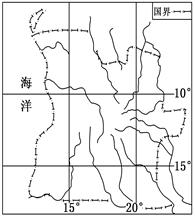问题
选择题
在某年上半年,中国从非洲国家安哥拉进口的原油同比增加了24.84%,从而使安哥拉超过沙特阿拉伯成为中国最大的原油供应国。读图安哥拉示意图回答下列问题。

小题1:若在装船的过程中发生了大量的石油泄漏,则以下地点可能监测到石油污染的是
A.印度
B.秘鲁
C.澳大利亚
D.巴西小题2:安哥拉沿海为世界著名渔场之一,关于该渔场成因的说法,错误的是
A.沿岸有上升流,饵料丰富
B.海区水温季节变化显著,海水上泛带来丰富的营养盐类
C.大陆架海区,阳光集中,生物光合作用强
D.入海河流带来丰富的营养盐类
答案
小题1:D
小题2:B
题目分析:
小题1:安哥拉沿海泄漏的石油,会受本格拉寒流、南赤道暖流和巴西暖流的影响,使巴西能检测到石油污染。故选D。
小题2:受离岸风影响,安哥拉沿岸有上升流,鱼类的饵料丰富;沿岸大陆架海区,海水浅,阳光集中,生物光合作用强,利用浮游生物生长,鱼类饵料丰富;入海河流带来丰富的营养盐类,利于浮游生物生长,鱼类饵料丰富;而该海区位于热带地区,水温季节变化小。故选B。
